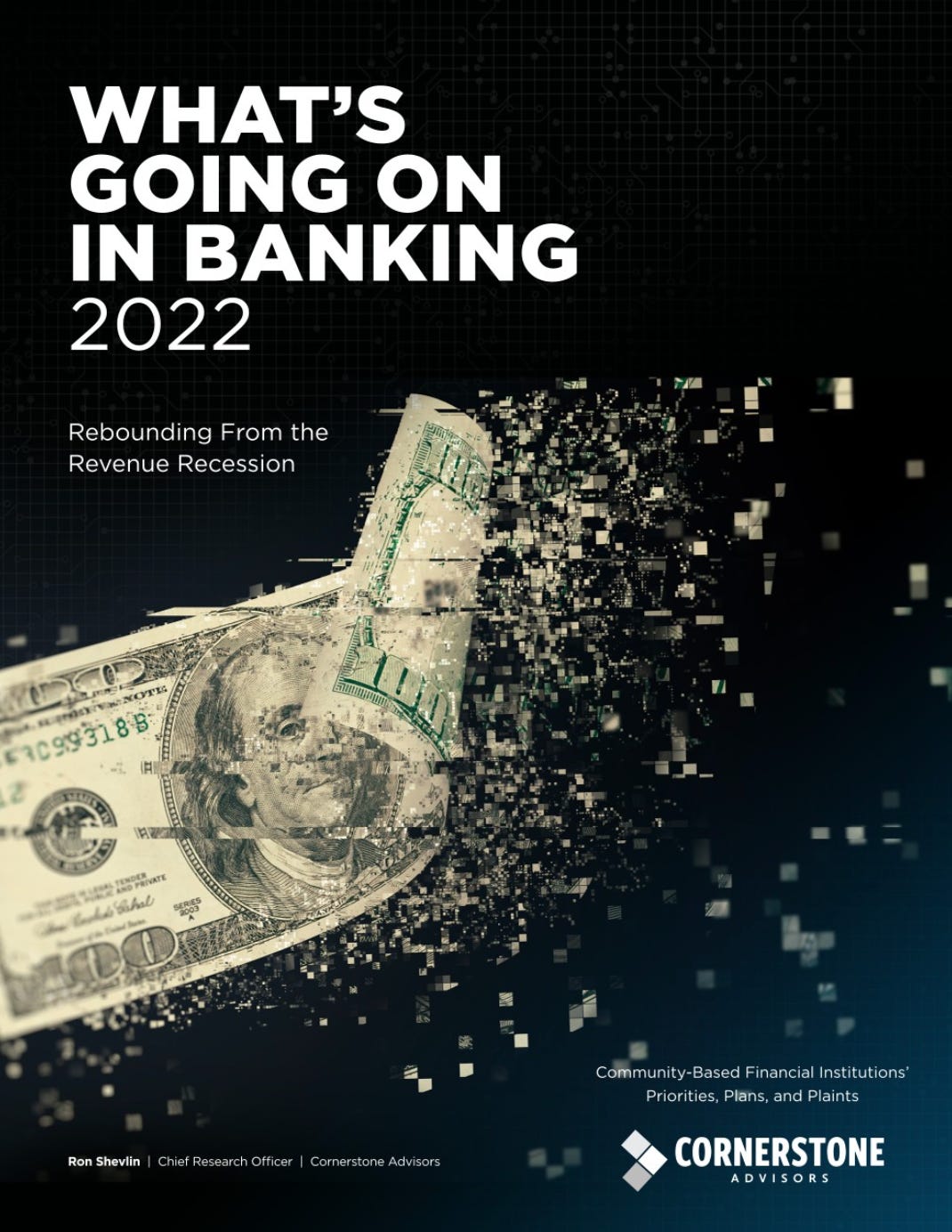Fintech Highlights - 12/21/2022
Pinned to the Top

Drivers are facing car insurance premium hikes in 2023 as more expensive vehicles and higher rates of crashes translate into more expensive coverage, Nathan writes.
Why it matters: Drivers are finally starting to see relief from sky-high gas prices, but now there's another rising input in auto budgets.
Driving the news: The average driver is expected to pay $1,895 per vehicle for car insurance in 2023, according to a study by Insurify, which analyzed 69 million rates in 50 states.
- That’s up 7% from 2022 and up 29.5% from 2020, and it marks the first time average insurance premiums will top $150 monthly.
The big picture: Vehicle prices have spiked since the pandemic due to production shortfalls and shoppers gravitating toward larger rides.
- The growing costs to repair and replace newer, more expensive vehicles with more expensive parts have been huge factors in the recent surge in insurance costs, Insurify’s Chase Gardner tells Axios.
Between the lines: More serious crashes are also at play, as auto safety watchdogs have reported increased speeding and reckless driving during the pandemic.
- “That’s leading to more claims being made to insurance companies,” Gardner says. “So they need to raise rates to offset that.”
Be smart: There are still some ways to save.
- Drivers can price shop for insurance online. They can also lower premiums by agreeing to install a remotely monitored insurance tracking device.
And of course, you can own a cheaper vehicle.
The BFD

Fintech startups — startups dabbling in banking, investing, budgeting and payments — remained red-hot this year, with 18% of global venture dollars going to fintechs in Q2 2022.
Why this is the BFD: That’s not surprising in light of recent findings from digital analytics company Amplitude, which show that fintech apps and services continued to add new users over the last year, hitting a peak in June and July at 22% higher growth compared to August 2021. The stats align with the results of a 2021 Plaid survey showing that nearly nine in ten Americans now use some kind of fintech app to manage their financial lives. Clearly, the economic downturn aside, fintech is here to stay — and going strong.
Will it stand in 2023? It remains to be seen. Joanna Glasner, of Crunchbase News, sees it this way: “Last year, financial services was the leading sector for venture investment, with at least $131 billion globally going into startups in the space. This year, the industry still ranks among the largest recipients of venture capital funding. However, investment to startups in the space has been dropping every quarter this year, with Q4 likely to be the lowest yet.”
Hold on to your hats - 2023 is going to be a very interesting year
M&A
JPMorgan (NYSE: JPM) acquired a 48.5% stake in Viva Wallet, an Athens-based payments tech company, for over $800 million. Viva had raised around $750m from firms like Tencent, Breyer Capital, Hedosophia and the European Bank for Reconstruction and Development. More here →
Chime, an SF-based fintech valued by VCs at $2.65b, was twice rebuffed in efforts to buy New York-based paycheck advance startup DailyPay, per The Information. More here →
United Fintech of London acquired Cobalt, a British provider of risk and data services to the FX and digital asset markets. Cobalt raised around $16m from firms like DCG, Citigroup and Standard Chartered. More here →
EQT Partners completed its $1.7b acquisition of Billtrust (Nasdaq: BTRS), a B2B accounts receivable automation and integrated payments company that went public last year via SPAC. More here →
Binance.US agreed to acquire assets of bankrupt crypto lender Voyager Digital for just over $1b. More here →
Embedded Insurance
Oyster, a New York-based embedded insurance startup through provides personal insurance through seamless point-of-sale and post-purchase experiences, raised $3.6m in seed funding. Oyster offers affordable rates tailored for each product line. With Oyster, a $5,000 ring can cost as low as $50 per year to insure, or $4 per month. Oyster provides full coverage from theft, loss, and accidental damage with deductibles as low as $0. More here →
Fintechs
DataVisor, a Mountain View, Calif.-based provider of online fraud detection and risk management software for financial services and e-commerce, raised $40m. DataVisor's Fraud and Risk Platform applies both business-specific rules and machine learning models to help users proactively identify fraudulent patterns and potential areas of vulnerability with high detection accuracy. More here →
Nilus, a New York-based financial ops platform, raised $8.6m in seed funding. The company offers “pre-built data connectors” and algorithms that allow finance teams to analyze data and ultimately automate reconciliation, reporting and payment workflows. More here →
Pocketnest, a Detroit-based financial wellness platform for companies, raised $2.6m. The company uses behavioral science and psychology to coach a businesses’ communities to achieve financial wellness in 3 minutes a week. More here →
Payments automation platform Plooto has raised $20 million in Series B funding. Plooto provides end-to-end accounts payable (AP) and accounts receivable (AR) automation software for small and medium-sized businesses (SMBs). About 8,500 finance teams, accountants and bookkeepers use the company’s cloud-based solutions. More here →
Poolit, a Miami-based fintech startup that aims to open up access to investing in private equity and VC funds raised $5.3 million in seed funding. Currently, Poolit offers accredited investors the ability to put money in two funds. The Imagine fund is all venture capital firms. The Horizon fund is all private equity firms. Bain Capital Ventures, Coatue, CD&R and Apax are among the firms that investors can put money into through the platform. More here ->
Vic.ai, which bills itself as an accounting automation platform powered by AI, announced that it raised $52 million in a Series C funding. The founders say that they built the first iteration of Vic.ai by training the platform on historical accounting data and processes from tens of thousands of public companies. The training data set contained accounting documents and corresponding journal entries that were reviewed by accountants at consultancy firms, including PricewaterhouseCoopers. This “live usage” helped to train Vic.ai’s machine learning algorithms over time, according to Hagerup, enabling it to provide nearly “complete autonomy” for transaction processing. More here ->
Bondaval, a London-based B2B fintech that gives credit teams the certainty that their receivables will be secured, has raised a $15 million Series A Round. Bondaval’s proprietary technology can be used to modernise and simplify B2B payment security by fractionalising the underwriting process and cost, making it possible to cover risks more comprehensively, expeditiously, and across more applications. More here ->
Fintel Connect , a Canadian based startup has raised $4.8 Million CDN. Fintel Connect’s proprietary technology delivers specialized tools designed to help North American FinTech firms, insurtech companies, banks, and credit unions acquire customers quickly, safely, and cost-effectively. More here →
Bling, a French provider of fintech tools to families, raised €3.5m in seed funding. The company offers a finance platform aimed specifically at families, which is designed so that parents can do financial planning for their children, from pocket money to first investments. More here →
Viva Republic, operator of South Korean finance app Toss, raised $405m in Series G funding at a $7b valuation. The new capital will help Toss accelerate growth for the challenger bank Toss Bank — launched last year by Viva Republica — and a Robinhood-like retail investment app, Toss Securities, which both look to turn a profit next year. More here →
Crypto
Amber Group, a Singapore-based crypto trading firm, raised $300m in Series C funding. Like other crypto trading firms, Amber was exposed to the FTX implosion. Less than 10% of its total trading capital was with FTX at the time of the collapse, the company said, “but we did have to rebalance some positions.” More here →
Investtech
Vint, a Richmond, Va.-based fractional investment platform for wine and spirits, raised $5m in seed funding led by Montage Ventures. There is no doubt that alternative investments are on the rise, with financial advisors communicating that the age-old 60/40 portfolio — 60% in equities, 40% in bonds — is no longer good enough. But “alts” come in all shapes and forms, and wine and spirits aren’t necessarily the most accessible, which is what Vint and others are working on changing. More here →
Insuretech
Evertas, a Chicago-based crypto insurance company, raised $14m in Series A funding. Insurance of cryptocurrency wallets against hacks, thefts and natural disasters hasn’t convinced all the major exchanges to be worth the squeeze, thanks to things like high premium, combined with unclear policy definitions. But in these uncertain times, having insurance over assets guarantees a third-party professional underwriting firm has scrutinized a firm’s systems and controls More here →
Roots Automation, creator of advanced, intelligent Digital Coworkers for the insurance industry, today announced significant achievements as it wraps up 2022. $10 Million in Funding, new Patent for AI Technology, Product Innovation, and Executive Hire with Deep AI Experience Mark Another Successful Year for the company. More here →
Insurtech Vouch launches web3 protection policy, touts as first insurance designed specifically for web3 companies. While traditional policies broadly exclude crypto, Vouch's Web3 Protection Policy has been designed with crypto, DAOs, NFTs, smart contract vulnerabilities, and more in mind. More here ->
From the Stash
Building the digital bank: a roadmap to modern infrastructure - FinTech startups have brought a new level of innovation to core banking functions such as payments and lending, to name just two areas. Simplicity, ease of use, and speed have been critical to their success. The rapid growth in digital banking (and the success of the upstart companies offering these services) have left established banks - More here →
Copper Launches Teen Investing Product To Power A Younger Generation of Investors - After engaging with 1,200,000+ Banking app users, Copper automates and simplifies real-world investing for teens from the ground up. More here ->
Visa to invest $1B in Africa over the next five years - Global payments giant Visa says it will invest $1 billion by 2027 to expand its investments in Africa amidst a digital payments boom on the continent. More here ->
Robinhood raised interest rates for Gold members — to 4% APY - “It’s our highest rate yet and is 21x more in interest when compared to the national average savings rate,* making it one of the best rates available.” More here ->
Building the digital bank: a roadmap to modern infrastructure - Emerging FinTech companies have built new services and offerings with customer experience at the forefront. These companies think more like software vendors than financial institutions and are carving into the profits and the very substance of what regional and community banks have done for generations. More here →

Reports / Webinars

Making embedded banking work
Banks must adapt to become the optimal embedded banking partner for brands, or risk becoming irrelevant in the BaaS ecosystem.
Partnering successfully needs multidisciplinary teams, a digital culture, effective collaboration processes and a modern, flexible tech stack.
This report by 11:FS in association with Infosys Finacle explores how banks can seize the opportunity and embed banking at scale.

—
☑️ Thanks for reading. Please ask your friends, colleagues and others to sign up. Use the field below.
If you have any companies or news to share - use the form
AND - if we’re not already connected - let’s do it.

